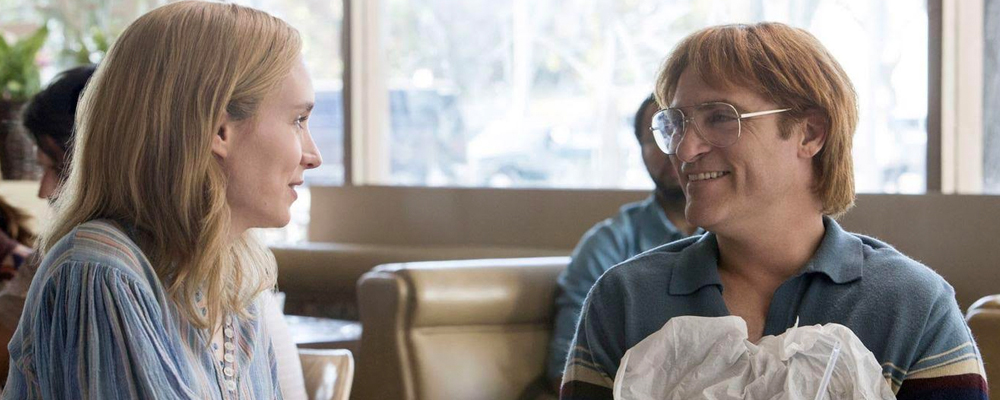Danny Elfman Talks Crafting Music for Gus Van Sant’s ‘Don’t Worry, He Won’t Get Far on Foot’
Alci Rengifo
Danny Elfman has composed scores for characters large and small. From the baroque symphonies of Tim Burton’s “The Nightmare Before Christmas” and “Charlie and the Chocolate Factory” to major motion pictures such as “Spider-Man” and “Justice League,” Elfman has crafted cinematic soundscapes that imprint themselves in the viewer’s mind. “Edward Scissorhands,” “Beetlejuice” and “Dick Tracy” are other classic titles featuring his name.. Now the maestro has reunited with director Gus Van Sant for “Don’t Worry, He Won’t Get Far on Foot,” which tells the tragic, comedic and inspiring story of cartoonist John Callahan, played by Joaquin Phoenix.
With Van Sant’s trademark style, serene, quirky yet with a very human touch, the movie chronicles Callahan’s journey as his partying ways get him into a car accident. Paralyzed for life, he begins an emotionally painful recovery process which leads him to new friendships and a discovery of a hidden talent for drawing. Callahan soon begins channeling his inner thoughts, rages and observations into cartoons full of acidic wit, sarcastic puns and lighthearted winks.
Elfman has collaborated with Van Sant multiple times in notable films such as “Good Will Hunting,” “Milk” and even the director’s shot by shot remake of “Psycho.” For “Don’t Worry, He Won’t Get Far on Foot,” Elfman uses a wistful approach featuring a piano and string quartet combination to capture Callahan’s fractured, quirky life and personality. The composer recently took some time to share with Entertainment Voice the process of crafting this score and the overall task of bringing a musical identity to a cinematic vision.
It’s been a lot of great films and a lot of great scores that you’ve given us. How did you prepare for this particular film? It’s such an interesting style that Gus Van Sant brings to this story.
I know this sounds weird, but I really try not to prepare as much as I can. I like to come in with my head as empty as possible. Other than the fact that Gus Van Sant sent me the script early on, I thought it was going to be really fun, especially knowing Joaquin Phoenix was going to play the lead role. I’m always so curious about what he’s going to do with anything. But I tried to come in with as few pre-conceived ideas as possible. There’s a point where I’m going to look at the film for the first time, and it’s never going to be what I imagined while reading the script, ever. It’s going to have its own tone, its own style and feel with the performances, editing and lighting. I’ll get interested in a story, but I won’t really have an idea until I see a rough cut.
We in the audience are obviously hearing the final product. But how does the process actually begin? Do you work at home? Do you have a specific place where you like to go and write the music?
I’m just at home. I have a studio in East Hollywood also that I work out of. Either place it’s the same, I’m just watching video and I have a piano and a bunch of sounds in front of me and I start to experiment. Now with Gus in particular, I am going to want to try a lot of radically different ideas because he really likes to mix and match. He likes to say “let’s do something completely crazy. Let’s just try it, let’s just experiment. Let’s try something crazy.” It’s just the way it is with him, which is one of the reasons I appreciate working with him. Sure enough this crazy jazz piece became the opening title sequence for the movie.
How is working with Gus Van Sant different from working with some of these other major directors you’ve collaborated with over the years? What sets him apart from someone like Tim Burton?
He in particular he likes to mix up styles of music. He likes to play things off the mark. There’s times where there’s something sentimental, and I can play something sentimental and he’ll say “let’s just play something really different there.” I don’t know how else to put it, he likes to kinda DJ and mix things up in a way that I find really fun. It’s never going to be quite what I’m expecting.
Once you have the idea for the score set, once you’ve written it, how long does it usually take to then record and get it all together for the film?
I’m usually on a film anywhere between six weeks and twelve or fourteen weeks. It can vary. Three months would be the average for a film. Let’s say I’m on for ten weeks, out of those ten weeks I’ll be using a couple of weeks for just experimenting and kind of messing around, then a week for honing down certain scenes. At a certain point it’s like, ok we’ve got six weeks, let’s really get down and start to score scenes and get more specific. In the end recording it, it depends on the score. If it’s a big orchestral score I can do anywhere from three days to a week in the studio. A movie like this I do it all in-house. It’s mostly me, guitar, piano, percussion, synthesizers. Sometimes I’ll be able to use a quartet. A low budget movie like this has a lot of restrictions, but that makes it more challenging.
Do you prefer working at home as opposed to standing in front of the whole orchestra in a concert hall?
I really like both. I like doing a movie like “Don’t Get Far on Foot” at home, but I’m about to do “The Grinch,” and that will be an entire week in front of a big orchestra with a choir and all that.
What are your thoughts on the current state of film composition? We’re starting to see a big mix up of styles. Synth scores are coming back in a big way.
It’s always changing and searching. I’m happy to see synth coming back, I like doing synth scores too. If I have one criticism it’s that there are too many big scores that feel like they’re all just orchestration. They feel very big, and never seem to do the wrong thing moment to moment, but nothing sticks with me. That leaves me like “eh.” But as soon as I feel very negative, like it’s all just big orchestration, then something interesting comes along that mixes it all up. I was very critical last year, then I heard the “Phantom Thread” score Jonny Greenwood did and I said, “this was the best score I’ve ever heard.” Anything is possible. There’s a lot of good scoring being done on TV too. You’ve got stuff that sounds generic, generic, generic and then “wow, what was that?!”
We’re barely half-way through the year but have any scores stood out for you from the movies you’ve been able to see this year?
Marco Beltrami did a great job in “A Quiet Place.” I loved that, that was a dream, doing a film with almost no dialogue. I would have killed for that (laughs). I would have killed Marco, if I thought it would have gotten me the job. But I happen to love Marco, so I wouldn’t actually kill him. I might kidnap him and have him held hostage in a cave. There was also a really interesting soundscape in “Hereditary,” not a traditional score at all, but I enjoyed it quite a bit. Unfortunately, like many people who work on films, I won’t get to see many of them until I get my Academy screeners at the end of the year.
“Don’t Worry, He Won’t Get Far on Foot” releases July 13 in select theaters.




